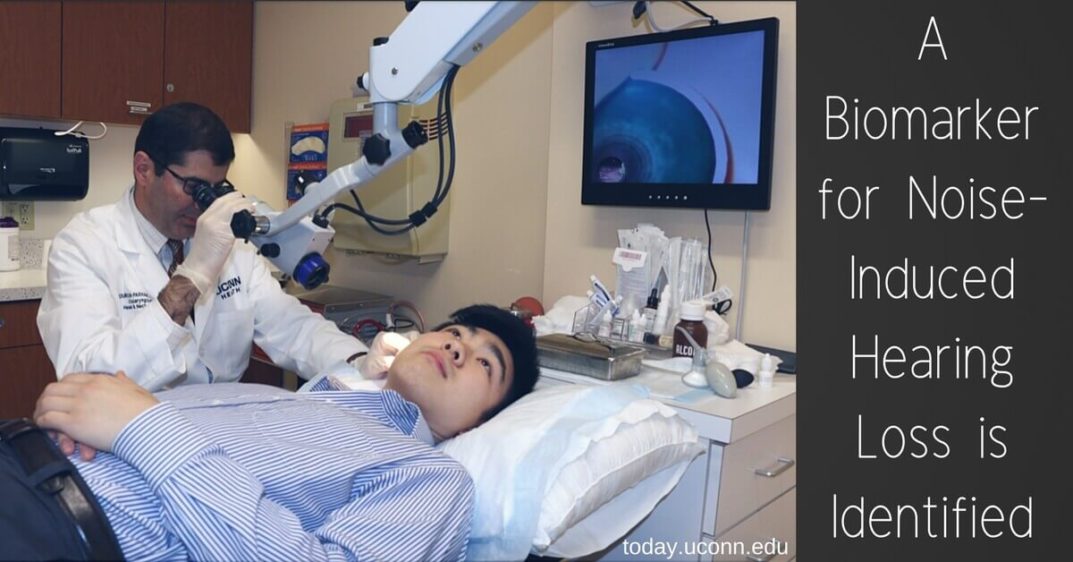The findings of an exciting new study were presented at the American Neurotology Society Annual Spring Meeting by researchers from UConn (University of Connecticut) Health’s Division of Otolaryngology. This study is the first of its type because it identified a potential biomarker for noise-induced hearing loss. In order to understand the findings, it is important to understand the basics first.
What is Noise Induced Hearing Loss?
Noise induced hearing loss is a completely preventable type of hearing loss that is caused by excess exposure to loud noises. This exposure can happen over a long period of time (for example a construction worker on a noisy site) or in one severe instance (for example shooting a gun without hearing protection). Everyone is at risk of noise induced hearing loss, regardless of age, gender or race. Hearing loss that is noise induced is rarely temporary, and almost always permanent.
What is a Biomarker?
According to Webster’s Dictionary, a biomarker is “a distinct biochemical, genetic, or molecular characteristic or substance that is an indicator of a particular biological condition or process” (http://www.dictionary.com/browse/biomarker?s=t). In this case, a biomarker is a physical presence that is indicative of noise induced hearing loss. This is such an exciting discovery because up until now, there were no known biomarkers of noise induced hearing loss. Because there have been no known biomarkers, audiologists could not diagnose noise induced hearing loss until the loss became severe enough for patients to volunteer for a hearing exam.
What Were the Findings of the Study?
Now that we have lain down a basic understanding of noise induced hearing loss as well as biomarkers, it is time to delve into the actual findings themselves. The researchers at UConn and Sensorion presented the information jointly. They were able to prove that a change in levels of prestin circulating within patients’ blood correlated with their degree of hearing loss. Prestin is an outer hair cell protein. Our outer hair cells play a critical role in our ability to hear information and transmit this information to our brains for processing.
This is fantastic news for audiologists. Dr. Kourosh Parham, associate professor and director of research at UConn Health’s Division of Otolaryngology stated, “Noise-induced hearing loss is a devastating condition that significantly affects patients’ quality of life … Working with Sensorion to arrive at these results has been an opportunity to introduce the field of otology to a new potential biomarker candidate for the future possible early diagnosis of hearing loss in patients before their condition becomes severe” (https://today.uconn.edu/2018/04/first-potential-biomarker-noise-induced-hearing-loss-identified/). As with most diseases or conditions, the earlier noise induced hearing loss can be identified, the better the chances for appropriate and effective intervention. This new biomarker may make diagnosing hearing loss at the earliest possible stages a reality for audiologists.
How do I Prevent Noise Induced Hearing Loss?
While this new biomarker may make early identification and early intervention possible for hearing loss sufferers, the best way to combat noise induced hearing loss is through prevention. Think about the activities you engage in every day. Do you ever find yourself in an environment where you would need to raise your voice to communicate with someone standing three feet away from you? If so, you are probably being exposed to excess noise that may result in noise induced hearing loss. If this occurs in your workplace, be sure to ask your manager about their policies for hearing protection at work. It is your right to work in a safe listening environment.
If you frequently attend loud sporting events, concerts or bars – be sure to wear hearing protection when possible. When this is not possible, attempt to stay as far away from the loudest noises as you can, and take frequent breaks from the action to give your ears a chance to recover.
The best way to determine if the music you listen to through headphones or earbuds are loud enough to damage your hearing, do this simple trick. Put your music on at the volume you typically listen to and hold the headphones or earbuds an arm’s length away from you. If you can hear your music at this distance, it is too loud. Try to follow the 60/60 rule when listening to personal devices to best protect your hearing. This rule entails listening to your music at no more than 60% volume, for no more than 60 minutes per day.
Visit Us at Comprehensive Ear and Hearing
Are you experiencing changes in your hearing? Visit us at Comprehensive Ear and Hearing for a thorough hearing test, which will provide answers about your hearing abilities.


